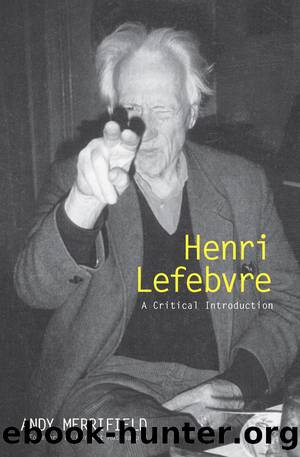Henri Lefebvre by Merrifield Andy

Author:Merrifield, Andy.
Language: eng
Format: epub
ISBN: 9781135435035
Publisher: Taylor & Francis (CAM)
Revolutionary refrains emanating from below, from a street praxis, are admittedly hushed in The Urban Revolution. Lefebvre has given us a quieter, more reflective analytical text, more cautious in its militant musings. But the idea of âvanquishing by styleâ offers clues to his revolution hopes, even if theyâre now dimmer. Here, for guidance, we must turn back the clocks briefly, to a pre-1968 work, La Proclamation de la Commune, written in 1965. Itâs hard to decide whether Lefebvreâs subject matter here was 1871 or 1968âwhether he was excavating the past or foreseeing the future; whether this was a historic day in March 1871, shattering the Second Empire, reclaiming Parisâs center for the people, toppling the imperial mantle of Napoleon III and sidekick Baron Haussmann or an imminent student-worker eruption that would almost smash the Fifth Republic of de Gaulle. Either way, it was the style of the Commune that whetted Lefebvreâs political palate. The Communeâs style, he says, âwas, first of all, an immense, grandiose festival, a festival that citizens of Paris, essence and symbol of the French people and of people in general, offered to themselves and to the world. Festival at springtime, festival of the disinherited, revolutionary festival and festival of revolution, free festival, the grandest of modern times, unfurls itself for the first time in all its dramatic magnificent joy.â17
For seventy-three days, loosely affiliated citizen organizations, neighborhood committees, and artist associations converted Paris into a liberated zone of anarcho-socialism. It was, Lefebvre notes, âgrandeur and folly, heroic courage and irresponsibility, delirium and reason, exaltation and illusionâ all rolled into one.18 Insurgents somehow corroborated Marxâs notion of revolutionary praxis at the same time as they refuted it, for this was as much a geographical as a historical event, no worker uprising incubated in the factories; rather, it was âthe grand and supreme attempt of a city raising itself to the measure of a human reality.â19 An urban revolution had made its glorious debut, reenergizing public spaces and transforming everyday life, touting victory while it wobbled in defeat. It was condemned to death at birth, despite the gaiety of its baptism. âThe success of revolutionary movement,â Lefebvre says, âmasked its failings; conversely, its failures are also victories, openings on to the future, a standard to be seized, a truth to be maintained. What was impossible for the Communards stays until this day impossible, and, by consequence, behooves us to realize its possibility.â20 âWe are thus compelled,â he reasons, âto rehabilitate the dream, otherwise utopian, and put to the forefront its poetry, the renewed idea of a creative praxis. There resides the experience of the Commune and its style.â21
This rhetorical flourish lingers in The Urban Revolution. But there it takes on a new twist, has an even broader message and implication. The urbanism of Haussmann tore out the heart of old medieval Paris and reinvented the concept of a center, of a downtown of bright lights and conspicuous consumption. Erstwhile pesky proletarians would take hold of shovels, man the building sites, and have no time to make trouble.
Download
This site does not store any files on its server. We only index and link to content provided by other sites. Please contact the content providers to delete copyright contents if any and email us, we'll remove relevant links or contents immediately.
Einstein: His Life and Universe by Walter Isaacson(1315)
Finding Freedom: Harry and Meghan and the Making of a Modern Royal Family by Omid Scobie & Carolyn Durand(1176)
Promised Land (9781524763183) by Obama Barack(1155)
Compromised by Peter Strzok(1070)
Finding Freedom by Omid Scobie(1061)
JFK by Fredrik Logevall(993)
Freedom by Sebastian Junger(633)
Salford Lads: The Rise and Fall of Paul Massey by Bernard O'Mahoney(580)
The Russia House by John Le Carré(563)
Kremlin Winter by Robert Service(528)
Day of the Dead by Mark Roberts(514)
Graveyard (Ed & Lorraine Warren Book 1) by Ed Warren & Lorraine Warren & Robert David Chase(506)
A World Ablaze by Craig Harline(505)
Flying Tiger by Samson Jack(501)
Joe Biden: American Dreamer by Evan Osnos(493)
100 Things Successful Leaders Do by Nigel Cumberland(478)
Melania and Me: The Rise and Fall of My Friendship With the First Lady by Stephanie Winston Wolkoff(476)
The Irish Buddhist by Alicia Turner(472)
The Mission by David W. Brown(460)
